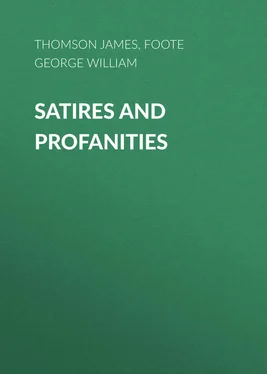George Foote - Satires and Profanities
Здесь есть возможность читать онлайн «George Foote - Satires and Profanities» — ознакомительный отрывок электронной книги совершенно бесплатно, а после прочтения отрывка купить полную версию. В некоторых случаях можно слушать аудио, скачать через торрент в формате fb2 и присутствует краткое содержание. Жанр: foreign_religion, foreign_antique, foreign_prose, на английском языке. Описание произведения, (предисловие) а так же отзывы посетителей доступны на портале библиотеки ЛибКат.
- Название:Satires and Profanities
- Автор:
- Жанр:
- Год:неизвестен
- ISBN:нет данных
- Рейтинг книги:4 / 5. Голосов: 1
-
Избранное:Добавить в избранное
- Отзывы:
-
Ваша оценка:
- 80
- 1
- 2
- 3
- 4
- 5
Satires and Profanities: краткое содержание, описание и аннотация
Предлагаем к чтению аннотацию, описание, краткое содержание или предисловие (зависит от того, что написал сам автор книги «Satires and Profanities»). Если вы не нашли необходимую информацию о книге — напишите в комментариях, мы постараемся отыскать её.
Satires and Profanities — читать онлайн ознакомительный отрывок
Ниже представлен текст книги, разбитый по страницам. Система сохранения места последней прочитанной страницы, позволяет с удобством читать онлайн бесплатно книгу «Satires and Profanities», без необходимости каждый раз заново искать на чём Вы остановились. Поставьте закладку, и сможете в любой момент перейти на страницу, на которой закончили чтение.
Интервал:
Закладка:
But while they they were in this passion of grief and despair, St. Ignatius offered to take the place of the dead Devil; and none could doubt that he with his Jesuits for imps would prove a most efficient substitute. Wherefore the Church threw off its sorrow and welcomed his offer with most holy rapture: —
“Noble fellow! cried all the court,
We bless thee for thy malice and hate.
And at once his Order, Rome’s support,
Saw its robe flutter Heaven’s gate.
From the angel’s tears of pity fell:
Poor man will have cause to rue, they said;
St. Ignatius inherits Hell.
The Devil is dead! the Devil is dead!”
Thus matters continued well for the Church of Rome, and, in fact, became even better than before. But if the Devil should die in the Church of England, whom has she that could efficiently take his place? She has no saints except the disciples and apostles of the New Testament, and these have long since gone to glory. Would Mr. Gladstone undertake the office? or Mr. Beresford Hope, with the Saturday Review for his infernal gazette? or the editor of the Rock? or he of the Church Times? or the man who does religion for the Daily Telegraph? Each of these distinguished gentlemen might well eagerly accept the candidature or a post so lofty: but I fear that none of them could be considered equal to its functions. Perhaps Mr. Disraeli has the requisite genius, and probably he would be very glad to exchange the Premiership of little England for that of large hell: but unfortunately he has already committed himself to the side of the angels, meaning by angels the humdrum Tory angels of heaven – for, as Dr. Johnson said, the Devil was the first Whig. On the whole, the Church of England had better keep loyal to its ancient and venerable Devil, being too impoverished in intellect and character to supply a worthy successor.
I have ventured to compare the government of the world in the Christian scheme, by a God and a Devil, with our own felicitous government by party. There is, however, or rather there appears to be, a striking difference between the two. In our government, when the Prime Minister finds himself decidedly in a minority, he goes out of office, and the Leader of the Opposition goes in; in the Government of the World the Leader of the Opposition seems to have always had an immense majority (and his majority in these days is probably larger than ever before, seeing that sceptics and infidels have multiplied exceedingly), yet the other side is supposed to retain permanent possession of office. I say “supposed,” because the Bible itself suggests that this popular opinion is a mistake, the Devil (if there be a Devil) being entitled by it the prince of this world, which surely implies his accession to power.
Although the Godhead or governing power of the world, according to the Christian scheme, is usually spoken and written of as a trinity, it is, in fact, quarterary or fourfold for Protestants, and quinary or fivefold for Roman Catholics. The former have God the Father, God the Son, God the Holy Ghost, and God the Devil; the latter supplement these with Goddess the Virgin Mary. Both formally acknowledge the first three as collectively and severally almighty, but Protestants implicitly acknowledge the fourth, and Roman Catholics the fifth, as more almighty still (these solecisms of dogma cannot be expressed without solecisms of language). With the Roman Catholics I am not concerned here. With regard to the Protestants, and those especially professing the Protestantism of the Church of England, I may safely affirm that the Devil is not less essential to their theology than is any person of the Trinity, or, in fact, than are the three persons together. Indeed, the Father and the Holy Ghost have been practically dispensed with, leaving Christ and Satan to fight the battle out between themselves.
As this is a gloriously scientific age, nobly enamored of the exact sciences, I will endeavor to expound this sublime subject of the divinity of the Church of England mathematically, even after the manner of the divine Plato in Book VIII. of “The Republic,” treating of divine and human generation; and in the “Timæus,” treating of the creation of the universal soul. His demonstrations, indeed, are so divinely obscure as to confound all the scholiasts; my demonstration, however, shall be so translucent that even the most learned and subtle lords of the Judicial Committee of the Privy Council, with their legal spectacles on, shall not be able to help seeing through it. And whereas the figures, which are shapes, are more intelligible to most people than the figures which are numbers, let the exposition be geometrical. We will say, then, that the Church of old conceived the divinity in the form of an equilateral triangle, whereof the base was Christ as the whole system was founded on belief in the Lord Jesus Christ, and the Father and the Holy Ghost were the two sides, leaning each on the other; and the Devil was the apex, as opposed to, and farthest from, our blessed Savior. But in course of time the theologians (perhaps merely wanting some occupation for their vigorous talents, perhaps deeming it undignified to have two persons of the godhead supporting each other obliquely like a couple of tipsy men, perhaps simply in order to make matters square) set to work, and pushed up the two sides, so that each might stand firm and perpendicular by itself. This process had two unforeseen results; it expanded the apex, which was a very elastic point, so that it became the crowning side of the square, and it so unhinged the sides that after a brief upright existence they lost their balance, and were carried to Limbo by the first wind of strange doctrine which blew that way; and the Devil and Christ, or Christ and the Devil (arrange the precedence as you please), were left alone confronting each other. These two are of course equal and parallel, the main distinction between them being that Christ is below, and the Devil above, or, in other words, that the Devil is superior and Christ inferior (the Devil seems entitled to the precedence). Thus matters have continued even to the present time, the divinity showing itself, as we may say, without form and void; and we are free to speculate on the momentous questions: Will the crown (which is the Devil) fall into the base (which is Christ)? Will the base float up into the crown? Will the two coalesce half way? Will they both, unknit from their sides, be carried away to Limbo by some blast of strange doctrine? One thing is certain, they cannot long remain as they are. Rare Ben Jonson chanted the Trinity, or Equilateral Triangle; rare Walt Whitman has chanted the Square Deific (with Satan for the fourth side); no poet can care to chant the two straight lines which, in the language of Euclid, and in the region of intelligence, cannot enclose a space, but are as a magnified symbol of equal – to nothing.
P. S. – It may be appropriately added that the books of Euclid are really symbolic and prophetic expositions of most sublime and sacrosanct mysteries, though in these days few persons seem aware of the fact. Thus the very first definition, “A point is position without magnitude,” exactly defines every point of difference between the theologians. So a line, which is as the prolongation of a point, or length without breadth, represents in one sense (for each symbol has manifold meanings) the history of any theological system. An acute angle is, say, Professor Clifford; an obtuse angle, Mr. Whalley; a right angle, the present writer: non angeli sed Angli . The first proposition, “To erect an equilateral triangle upon a given finite straight line,” indicates the problem solved by Christianity, when it erected the Trinity on the basis of the man we call Jesus. This pregnant subject should be worked out in detail through the whole eight books.
Читать дальшеИнтервал:
Закладка:
Похожие книги на «Satires and Profanities»
Представляем Вашему вниманию похожие книги на «Satires and Profanities» списком для выбора. Мы отобрали схожую по названию и смыслу литературу в надежде предоставить читателям больше вариантов отыскать новые, интересные, ещё непрочитанные произведения.
Обсуждение, отзывы о книге «Satires and Profanities» и просто собственные мнения читателей. Оставьте ваши комментарии, напишите, что Вы думаете о произведении, его смысле или главных героях. Укажите что конкретно понравилось, а что нет, и почему Вы так считаете.












